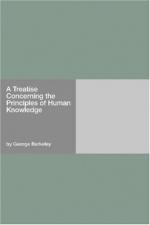63. It may indeed on some occasions be necessary that the Author of nature display His overruling power in producing some appearance out of the ordinary series of things. Such exceptions from the general rules of nature are proper to surprise and awe men into an acknowledgement of the Divine Being; but then they are to be used but seldom, otherwise there is a plain reason why they should fail of that effect. Besides, God seems to choose the convincing our reason of His attributes by the works of nature, which discover so much harmony and contrivance in their make, and are such plain indications of wisdom and beneficence in their Author, rather than to astonish us into a belief of His Being by anomalous and surprising events.
64. To set this matter in a yet clearer light, I shall observe that what has been objected in sect. 60 amounts in reality to no more than this:—ideas are not anyhow and at random produced, there being a certain order and connexion between them, like to that of cause and effect; there are also several combinations of them made in a very regular and artificial manner, which seem like so many instruments in the hand of nature that, being hid as it were behind the scenes, have a secret operation in producing those appearances which are seen on the theatre of the world, being themselves discernible only to the curious eye of the philosopher. But, since one idea cannot be the cause of another, to what purpose is that connexion? And, since those instruments, being barely inefficacious perceptions in the mind, are not subservient to the production of natural effects, it is demanded why they are made; or, in other words, what reason can be assigned why God should make us, upon a close inspection into His works, behold so great variety of ideas so artfully laid together, and so much according to rule; it not being credible that He would be at the expense (if one may so speak) of all that art and regularity to no purpose.
65. To all which my answer is, first, that the connexion of ideas does not imply the relation of cause and effect, but only of a mark or sign with the thing signified. The fire which I see is not the cause of the pain I suffer upon my approaching it, but the mark that forewarns me of it. In like manner the noise that I hear is not the effect of this or that motion or collision of the ambient bodies, but the sign thereof. Secondly, the reason why ideas are formed into machines, that is, artificial and regular combinations, is the same with that for




